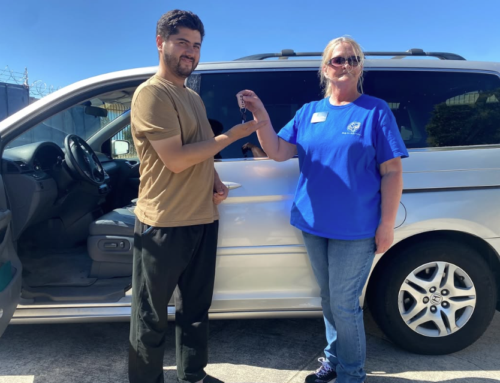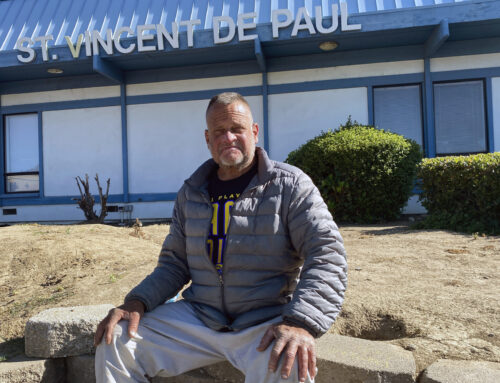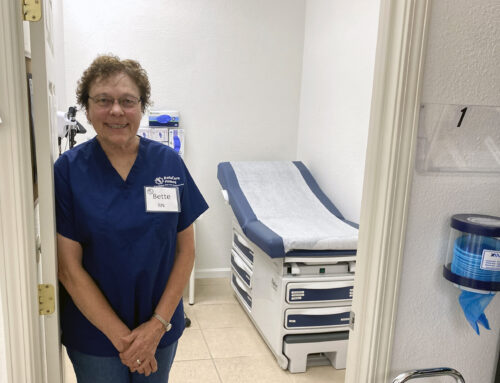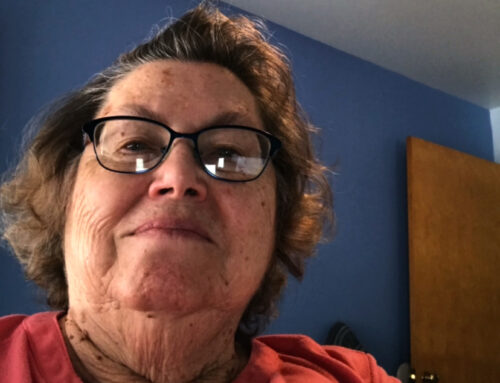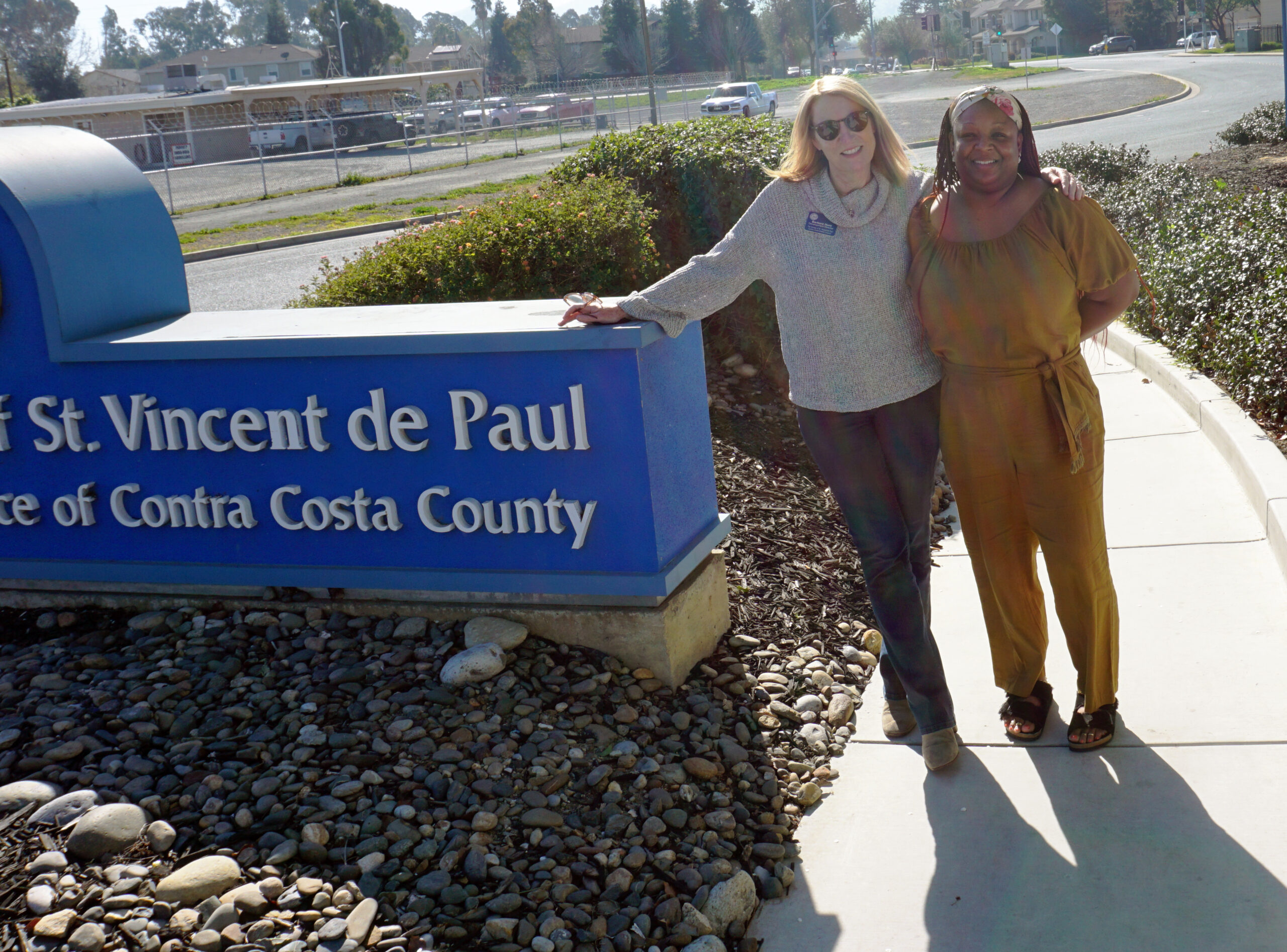
SVdP’s Development Director Barbara Hunt stands with Ariel Reese outside of the SVdP Family Resource Center in Pittsburg. Ariel volunteered with SVdP after receiving help for her family during the pandemic.
When the COVID-19 pandemic started, Ariel Reese and her husband Jessie thought they would be able to weather the storm. With five children in their Antioch home, (three of their own plus a niece and nephew), as well as caring for Jessie’s elderly father, the Reese’s plate was full. As successful business owners they felt they could manage the pandemic’s challenges and keep their family and business moving forward.
As days became weeks, which became months of events being shut down and traditional shopping being disrupted, their food truck business began to suffer. The festivals, events, and car shows that Ariel and her husband based their business upon were still shutdown, with no sign of coming back. As their savings dwindled and the pandemic made no sign of abating, Jessie returned to working in construction, and Ariel began driving for Uber when she had time between caring for her children and father-in-law.
“The school shutdowns nearly broke me,” Ariel said. “My youngest is 8 years old, the rest are teens, and it was just constant fighting on top of the stress of trying to figure out what we were going to do.”
The pandemic, unfortunately, only got worse. Construction slowed to a halt, and Jessie found himself out of work again, and the State considered him ineligible for unemployment because he had not worked long enough before shutdowns cost him his job. Faced with growing bills – mortgage, utilities, and even college tuition for their eldest – the Reese family had to make a drastic decision. They had depleted their savings, and there was no sign of help from the State, as the Housing is Key program’s assistance for mortgage holders did not begin until December 2021.
“We sold our food trucks so we could keep our house,” Ariel said. “I’m from Compton, and I had a hard upbringing, I’m no stranger to doing what needs to be done to get by. I’ve always volunteered at the church, I know that help is available, but it can still be hard to look for it, especially because we had so much then.”
Ariel first reached out to county housing assistance programs she knew about, but was ineligible because their programs were only for renters. In January 2021, California launched Housing is Key , a program designed to assist renters and landlords whose income was impacted due to the pandemic. Ariel said it was extremely disheartening that she was unable to find help. Ariel said, “I mean, we paid our taxes. We paid a lot in taxes. But it felt like when we needed the State to turn around and help us, that they just weren’t interested.”
Ariel said she knew there had to be help out there, and she was determined to find it for her family.
“The worst thing anyone can say to you is ‘No’,” Ariel said. “You wake up every day starting from ‘No,’ so I was determined to find someone who would say ‘Yes’.”
Ariel called 211, and was referred to at St. Vincent de Paul of Contra Costa County. SVdP’s team at the Family Resource Center in Pittsburg helped connect Ariel to SVdP’s network of volunteers, who were able to help the Reese family with their mortgage, as well as food and utility assistance. “It was a huge relief to finally find someone who seemed to care,” Ariel said. “When I started talking to the people at SVdP it was like I was talking to real humans that really cared about people.” Ariel added, “the people I talked to at SVdP were utterly human and kind. I really needed to find them when I did.”
Moved by the help she received, Ariel came to volunteer at SVdP over Thanksgiving and Christmas. Ariel helped greet the neighbors in need that SVdP helps every day, and helped provide them with gift cards for food so they and their families could celebrate the holidays in comfort and dignity.
“The help we’ve received means a lot to me,” Ariel said. “I’m extremely grateful. Not just for the help my family received, but also to be treated like a person. It really helps.”
Ariel and her family have not given up on their dream of being successful business owners. The pandemic cannot keep them down. Ariel and Jessie are working on exploring their options, to see if it might be possible to get a loan to purchase a food truck again and restart what was a successful business. Though recent events have seen an increase in the cost of cars and trucks, the Reese family is the picture of resilience and cannot be stopped.
“A lot of people need help,” Ariel said. “It can be harder to get help then it is to buy a house in some cases, but when you find it it is really meaningful. Thank you.”

